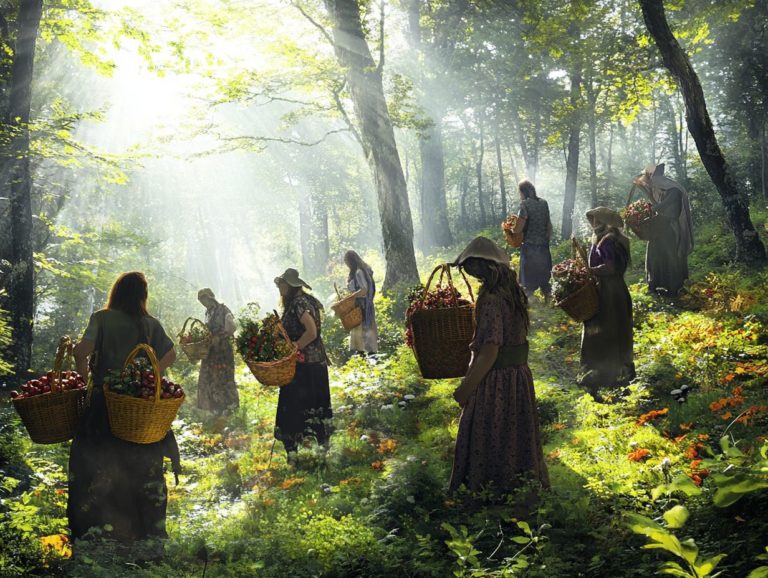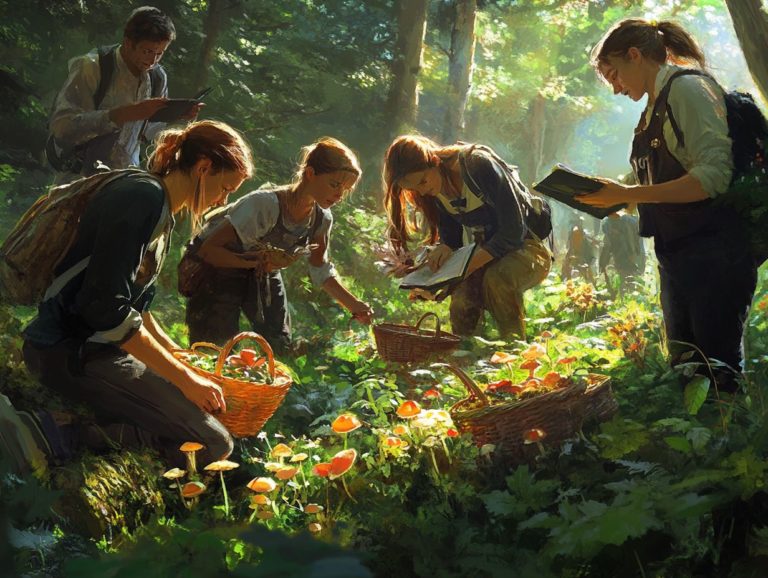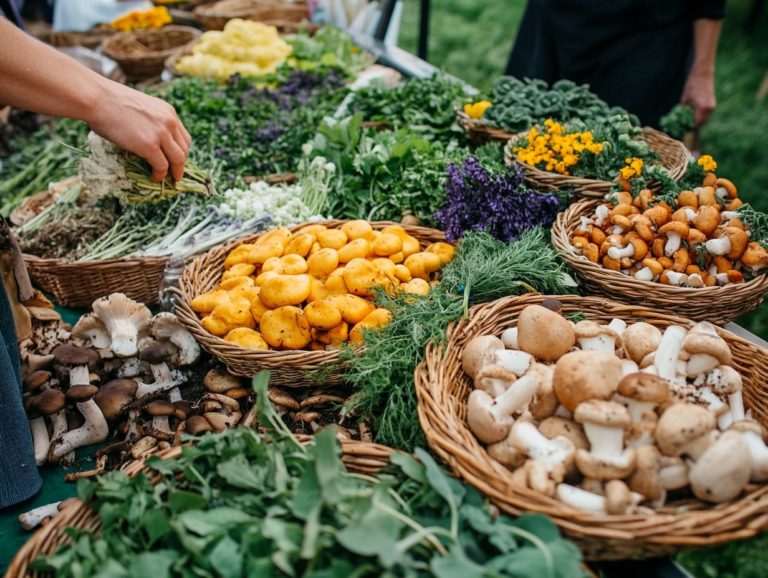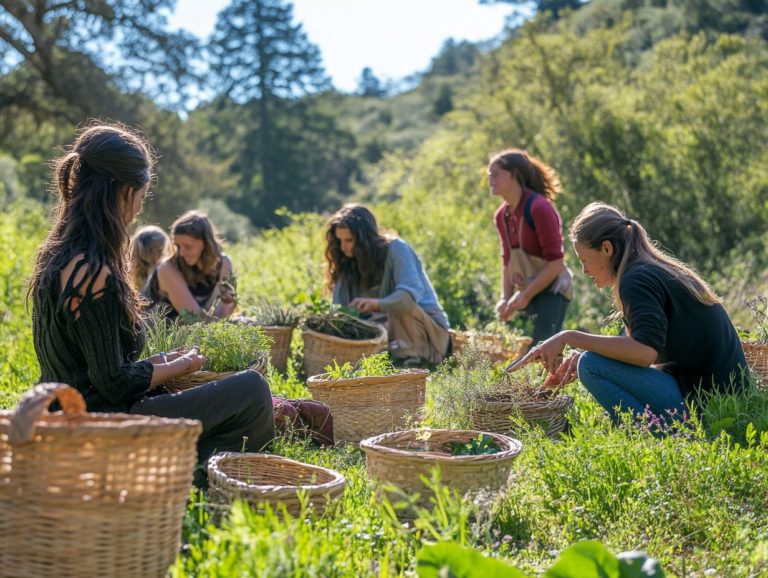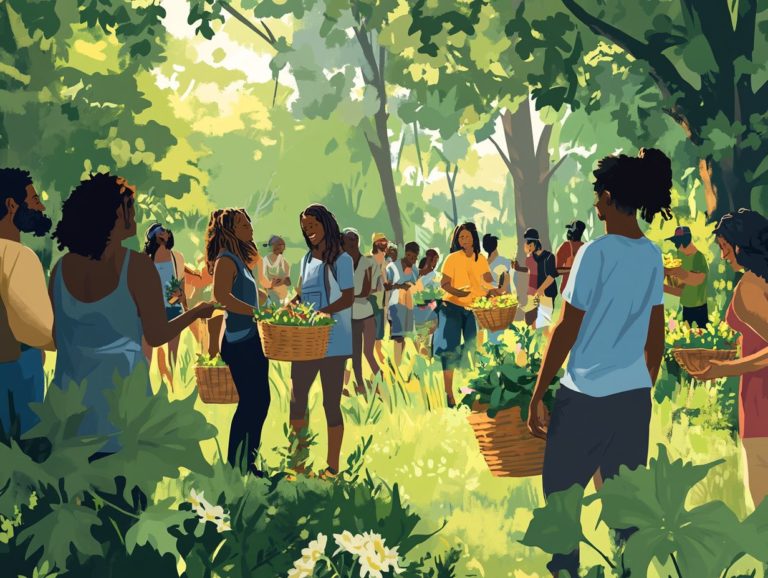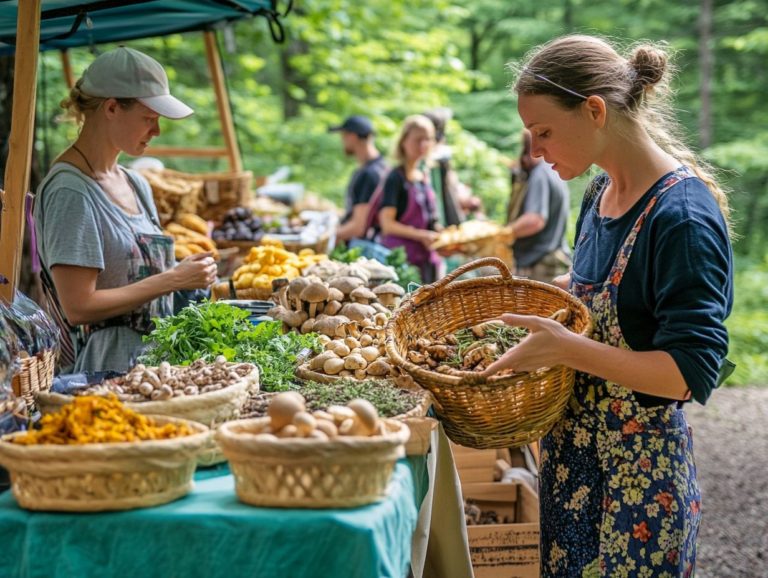Promoting Ethical Foraging in Your Community
Foraging has experienced a remarkable resurgence as you seek a deeper connection with nature and embrace a sustainable lifestyle, particularly through the emerging practices of urban foraging.
Grasping the principles of ethical foraging is essential for preserving ecosystems and ensuring that future generations can revel in these natural resources.
This article delves into the definition and benefits of ethical foraging while illuminating the challenges it encounters. You ll find practical tips for foraging responsibly, empowering you to engage in this fulfilling activity with confidence.
It also shows how you can support ethical practices in your community, ensuring that foraging serves as a boon for both people and the planet.
Join us on this exciting journey to explore ethical foraging today!
Contents
- Key Takeaways:
- Understanding Ethical Foraging
- Benefits of Ethical Foraging
- Challenges to Ethical Foraging
- Promoting Ethical Foraging in Your Community
- Practical Tips for Ethical Foraging
- Resources for Ethical Foraging
- Frequently Asked Questions
- What is Ethical Foraging and Its Connection to Food Justice?
- Why is it Important to Promote Ethical Foraging in Your Community?
- How Can I Get My Community Involved in Promoting Ethical Foraging?
- What are Some Ethical Guidelines for Foraging?
- Can Foraging be Harmful to the Environment?
- Are There Any Health Considerations to Keep in Mind When Foraging?
Key Takeaways:
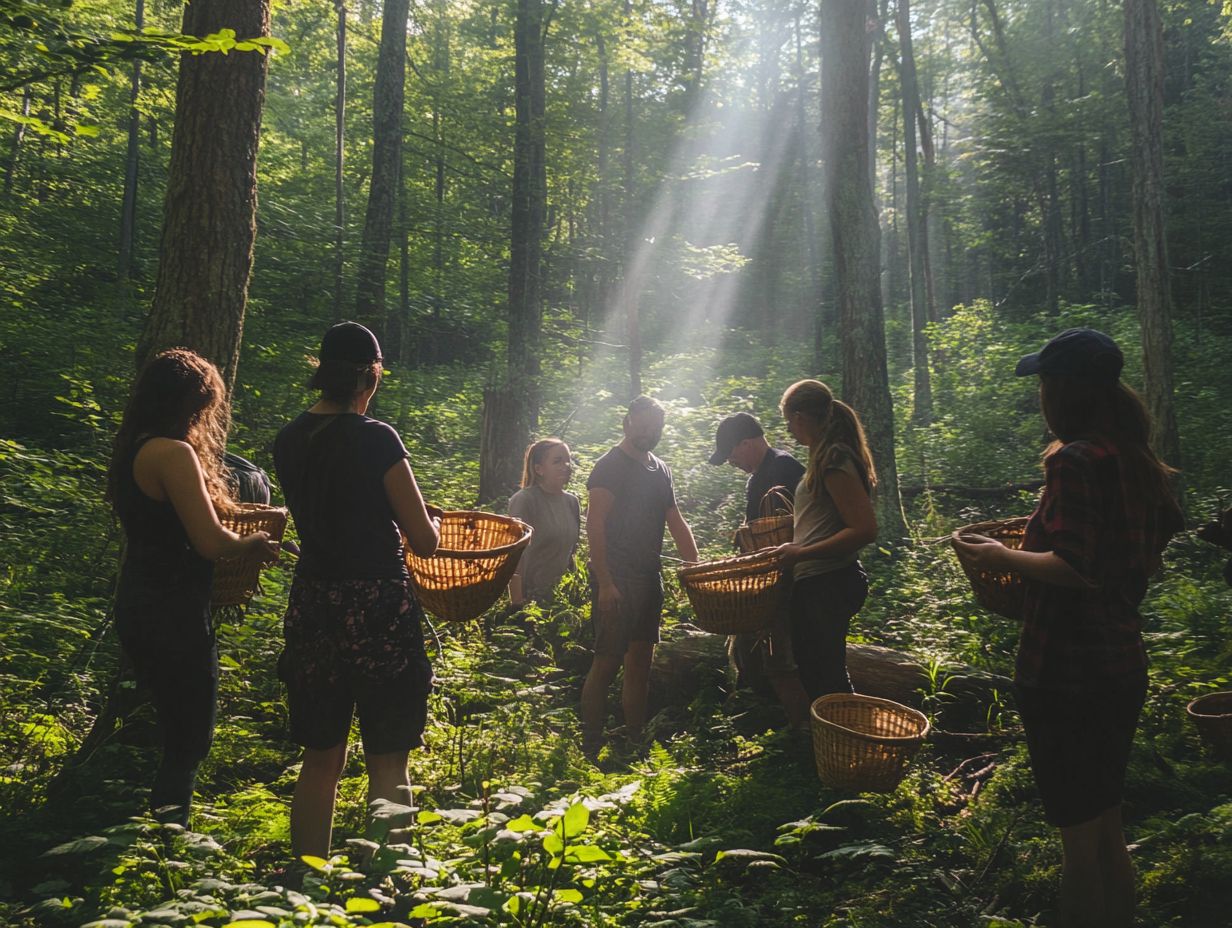
- Educate yourself and your community about ethical foraging and its importance.
- Work with local organizations to promote ethical foraging.
- Follow best practices when foraging to respect nature.
Understanding Ethical Foraging
Understanding ethical foraging means embracing principles and practices that support sustainability, respect for local ecosystems, and community control over food sources. This approach aligns with protecting nature through sustainable foraging techniques, all while cultivating a profound connection with nature.
This practice bridges modern food systems with traditional methods. It is often rooted in Indigenous culture.
Ethical foraging invites you to engage with your environment responsibly, ensuring that local communities reap the benefits of harvesting wild edible and medicinal plants. If you’re interested in forming a community around this practice, consider these tips for starting your own foraging group, while prioritizing the conservation of the environment.
Defining Ethical Foraging
Ethical foraging is all about harvesting wild edible plants and mushrooms, like morel mushrooms, in a way that respects nature and supports local food systems. You re engaging in a practice rooted in sustainability, highlighting the importance of leaving enough for future generations while promoting biodiversity.
Respecting nature isn’t just about avoiding overharvesting; it also requires a deep understanding of ecosystems and the role each plant plays within them. For you, ethical foraging goes hand-in-hand with food justice and activism, advocating for equitable access to the nutritious foods found in the wild.
Wildcrafting is an essential part of this journey, allowing you to gather materials in a manner that honors traditional methods and respects local cultures. Safety is crucial. Knowing which plants are safe to eat helps build a responsible community of foragers who protect nature.
Benefits of Ethical Foraging
The benefits of ethical foraging extend beyond personal enjoyment. They enhance community health, boost food security, and support local food systems, especially when following sustainable foraging practices.
By embracing sustainable foraging practices, you gain access to seasonal ingredients and wild edibles, while also nurturing stronger connections within your community and supporting local ecosystems. You can even engage in initiatives like community gardens.
This approach can elevate food education and foster a deeper awareness of the significance of food sovereignty.
Environmental and Personal Benefits
The environmental benefits of ethical foraging are noteworthy. It enhances biodiversity, safeguards local ecosystems, and promotes conservation through practices like wildcrafting.
On a personal level, you reap the rewards of improved health and well-being through the consumption of fresh, organic food sources.
When you engage in foraging, you gain access to nutrient-dense foods while nurturing a deeper connection to the land and your community. This practice plays a vital role in sustaining habitats that support native species and promotes healthy ecosystems.
Sharing your foraged treasures fosters collaboration and knowledge exchange within local communities, strengthening social ties and elevating nutrition awareness. By exploring volunteer opportunities for foraging enthusiasts, you can minimize your environmental footprint and contribute to the preservation of flora and fauna. Ultimately, you cultivate healthier ecosystems and resilient communities.
This mindful approach not only enriches your life. It also benefits nature, making ethical foraging a true win-win for you and the environment.
Challenges to Ethical Foraging
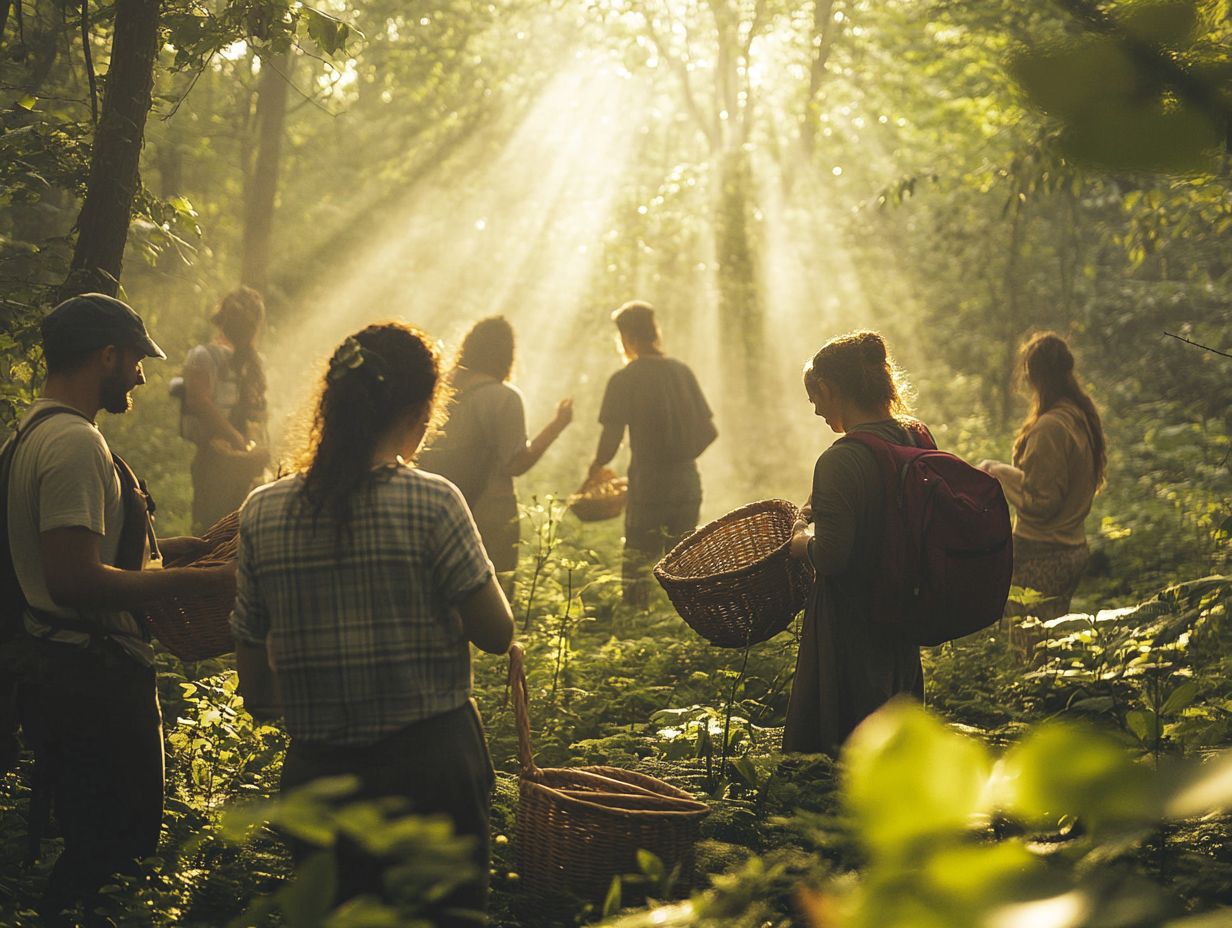
Despite the many advantages of ethical foraging, you may encounter challenges such as food deserts, limited access to foraging resources, a lack of awareness about foraging practices, and the repercussions of urbanization on local ecosystems.
These factors can complicate your access to valuable foraging resources act now to overcome these challenges!
Obstacles and Controversies
Obstacles to ethical foraging frequently emerge from the controversies surrounding land use, environmental ethics, and the impact of urban parks on access to wild edible plants.
As urbanization advances, green spaces are increasingly sacrificed for commercial developments, constraining your opportunities for foraging. This transformation prompts essential inquiries about food activism and the ethical responsibilities you bear as an urban dweller eager to engage with your environment sustainably.
The real challenge lies in striking a balance between the need for accessible public spaces and the preservation of natural habitats, essential for both biodiversity and foragers like yourself. The varying regulations governing land use can create a landscape of confusion and conflict, leaving you unsure about the legality and ethics of your foraging practices.
These dynamics highlight the intricate connections between community engagement, environmental stewardship, and the cultural significance of foraging in urban settings, especially in urban parks where foraging education can thrive.
Promoting Ethical Foraging in Your Community
Get excited about promoting ethical foraging for wild plants in your community! Start by cultivating education and awareness around sustainable practices. It’s essential to encourage collaboration with local organizations and engage with community support systems dedicated to food activism and organic farming initiatives.
By fostering these connections, you can create a vibrant network that champions responsible foraging and sustainable food practices.
Education and Awareness
Education and awareness stand as essential pillars in the realm of ethical foraging, providing you with the critical knowledge needed for plant identification and foraging safety, enabling responsible engagement with nature.
By deepening your understanding of the local ecosystem and incorporating techniques like plant identification, you transform into a more mindful forager. You actively minimize your impact on biodiversity and champion sustainable practices for the benefit of future generations. Community workshops, online courses, and field guides become your invaluable allies, offering insights into native species and their habitats while underscoring vital safety measures.
Grasping the nutritional benefits of foraged foods not only enhances your personal well-being but also bolsters community health and food education initiatives. This awareness enables you to forge a deeper connection with your environment and fosters a healthier lifestyle through informed foraging choices, empowered by platforms like social media for sharing knowledge and resources.
Collaboration with Local Organizations
Collaboration with local organizations, like community gardens and foraging groups, is crucial for promoting ethical foraging practices that not only enhance local food systems but also strengthen community ties.
Pooling resources and sharing knowledge enhances ethical foraging practices, as discussed in seasonal foraging: building community through edibles. This helps ensure that foraged goods do not deplete local ecosystems.
Engaging with neighborhood food systems allows you to cultivate a deeper appreciation for native plant species while also tackling food insecurity. Participating in workshops that offer hands-on experiences equips you with the skills to identify safe, nutritious wild edibles, ultimately encouraging care for the environment.
Together, these initiatives can fortify relationships within your community and create a shared commitment to preserving and celebrating local biodiversity.
Practical Tips for Ethical Foraging
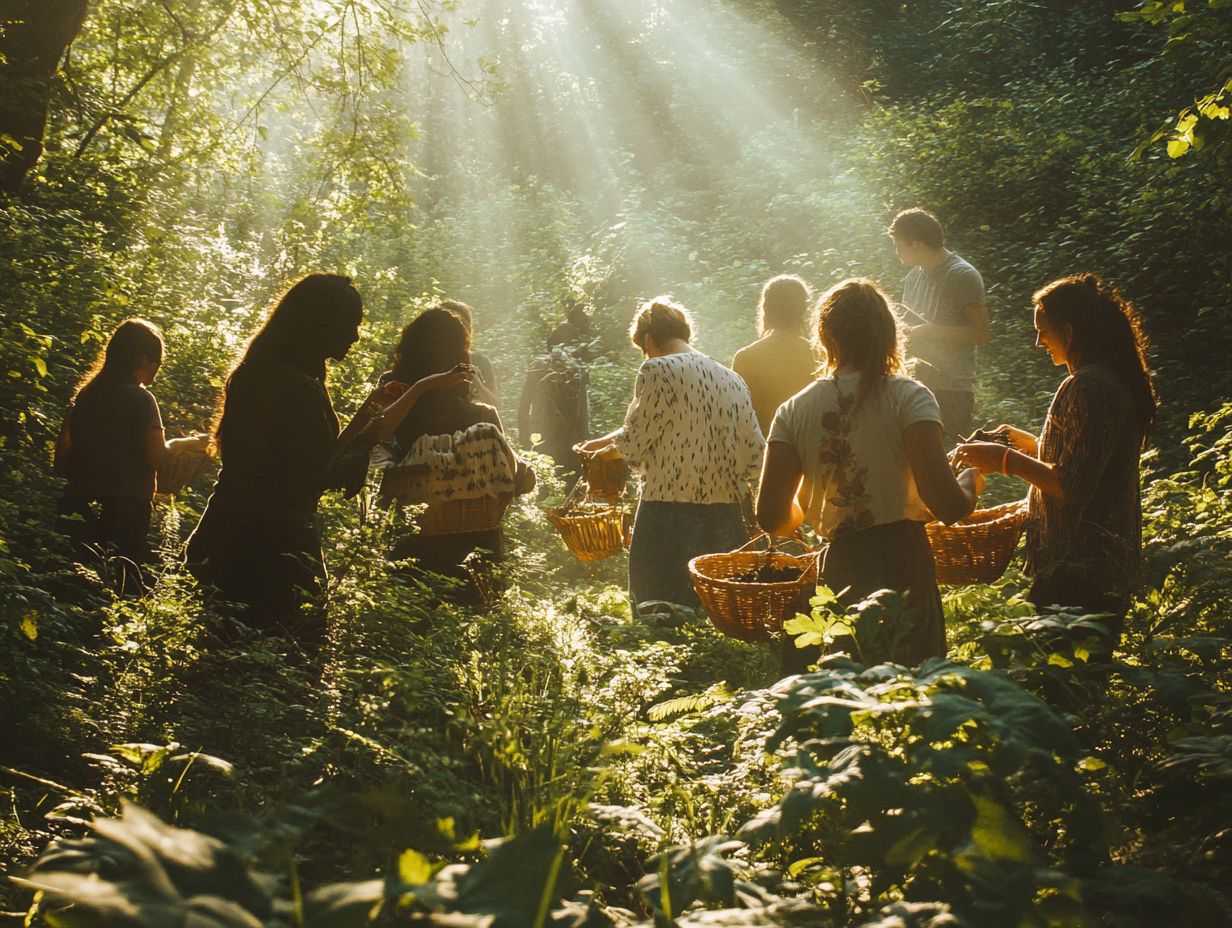
For ethical foraging, dive into practical tips to elevate your foraging experience! Begin by mastering effective harvesting techniques that respect nature while ensuring your safety.
It s vital to deepen your understanding of the plant species, such as dandelion and stinging nettle, that thrive in your local ecosystem. Focus on those that are both beneficial and edible.
This knowledge not only enhances your foraging skills but also fosters a profound connection with the environment around you, enriching your understanding of local cuisine and food culture.
Best Practices and Guidelines for Engaging in Effective Foraging
As a responsible forager, it s essential to embrace best practices and guidelines that align with sustainable principles while honoring local food justice initiatives and preserving natural habitats.
These practices highlight the significance of engaging with your community and educating yourself about the ecosystems you encounter. It s essential to take only what you need, allowing plants and wildlife to flourish and regenerate.
By being mindful of seasonal availability and prioritizing native species over invasive ones, you can significantly contribute to biodiversity and strengthen local food systems.
Collaborating with local organizations raises awareness about foraging resources. This reinforces the understanding that food justice is intricately linked to environmental stewardship and the well-being of the community.
Resources for Ethical Foraging
Don t wait! Explore these resources today to enhance your foraging skills! You have a wealth of resources at your fingertips think websites, apps, and books that offer invaluable insights into plant identification, foraging safety, and effective harvesting techniques.
These tools elevate your foraging education, enriching your experience in the great outdoors.
Websites, Apps, and Books
Several websites, apps, and books stand out as exceptional resources for ethical foraging, offering you valuable insights into local edible plants, foraging safety, and sustainable practices.
Among the noteworthy options, apps like ‘Forager s Journal’ equip you with interactive plant identification features and a space to document your discoveries. Websites such as ‘Wild Food Adventures’ and ‘EatTheWeeds’ are critical for learning about wild edibles and the principles of responsible foraging.
Books like ‘The Forager s Harvest’ by Samuel Thayer delve deeply into the intricacies of foraging, enhancing your understanding of both plant biology and harvesting techniques. Together, these resources not only educate but also cultivate a community committed to sustainable foraging practices.
Frequently Asked Questions
What is Ethical Foraging and Its Connection to Food Justice?
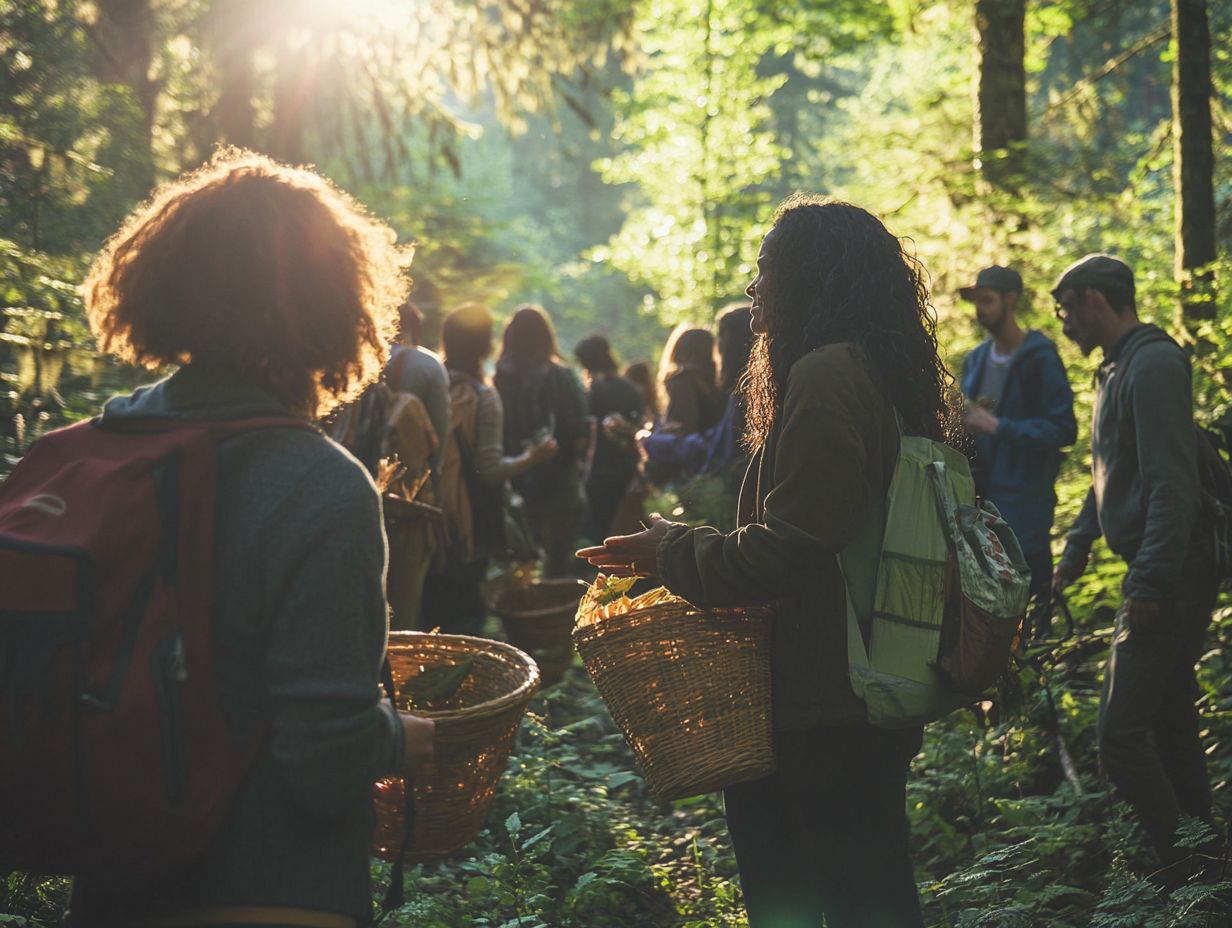
Ethical foraging is the practice of gathering wild plants, fungi, and other natural resources in a sustainable way. This practice is crucial for food justice, which means ensuring fair access to healthy food for everyone.
Why is it Important to Promote Ethical Foraging in Your Community?
Promoting ethical foraging not only preserves local ecosystems and ensures resources remain abundant, but you can learn more about this practice by exploring foraging ethics, which also fosters respectful relationships with nature.
How Can I Get My Community Involved in Promoting Ethical Foraging?
Start by educating your community on ethical foraging principles. Organize workshops and encourage people to follow best practices.
What are Some Ethical Guidelines for Foraging?
Ethical guidelines include:
- Taking only what you need while leaving enough for plants to regenerate.
- Avoiding damage to the environment.
- Respecting private property.
Can Foraging be Harmful to the Environment?
Yes, if not done ethically, foraging can harm the environment. Over-harvesting and damaging habitats can lead to ecological issues.
Are There Any Health Considerations to Keep in Mind When Foraging?
Absolutely! Properly identify plants before consuming them. Forage in clean areas, free from pollution.

